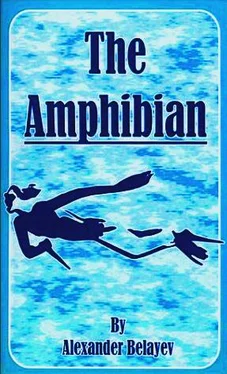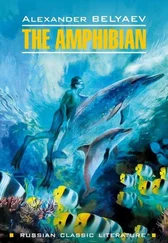No sooner Cristo was safely on the ground than he heard Salvator’s voice.
“Hey, Cristo, where are you?”
The Indian grabbed a rake lying on the path and applied himself to gathering dry leaves.
“I’m here,” he shouted.
“Come along, Cristo,” Salvator said, striding onto the path and across to the secret door. “To open you press here,” and he pressed the very boss Cristo had just used.
A bit late, aren’t you, I’ve seen your devil, thought Cristo.
They went into the orchard. Salvator led the way past the lichen-clad house straight to the swimming pool. The monkey was still underwater, crouching where he had left it, letting out little bubbles of air at each exhalation.
At the sight of the monkey Cristo went through a little show of surprise, which, almost at once, turned to genuine.
For Salvator was paying no attention to the monkey, apart from waving his hand at it as if dismissing it. Promptly the monkey swam up, scrambled out, shook itself and climbed a tree. Salvator bent down and pressed in a small green panel, concealed in the grass. There was a hollow rumble and hidden hatches yawned open all along the bottom of the pool. The water gushed through. In a few minutes the pool was dry. The hatches snapped shut. An iron ladder, reaching down to the bottom, slid into view from its place somewhere in the side of the pool.
“Come on, Cristo.”
They climbed down. Salvator stepped on a tile and another hatch opened — in the centre of the pool. Iron steps led down into the darkness.
Cristo followed Salvator down into a corridor, faintly illumined by the light falling through the hatch. As they proceeded it soon gave way to complete darkness. The echo of their footsteps rang dully in the corridor.
“We’re nearly there, Cristo.”
Salvator halted and ran his hand along the wall. There was a click and floods of brilliant light. They stood in a stalactite cave, facing a brass door with lions’ heads gripping brass rings in their jaws. Salvator pulled at one of the rings. The stout door swung open, letting them into a dark hall. There was another click as a globular opaque lamp lit up a big cave whose far wall was all glass. Salvator worked the switches. The cave was dark again, then several powerful searchlights threw their beams into what looked an immense aquarium just behind the glass wall. Fish frisked among the seaweeds and corals. Suddenly Cristo saw a humanlike creature, with huge globular eyes and frog’s paws, step out from behind a tangled growth of seaweeds. The creature swam with easy grace towards the glass wall, in a close-up of immense eyes and silvery-blue scales, nodded to Salvator, entered an allglass cubicle that was at one side of the wall and shut the glass door. The cubicle was quickly emptying. The stranger opened the other door and was in the cave.
“Take off your gloves and goggles,” said Salvator.
The newcomer obediently took the things off and Cristo faced a slim good-looking young man.
“Please meet Ichthyander the amphibian, or the ‘sea-devil’ as he is also known,” Salvator introduced the young man to Cristo.
The young man was smiling amiably as he offered his hand to the Indian.
“Hullo,” he said in Spanish.
Cristo pressed the offered hand. He was too stunned for speech.
“The Black who’s serving Ichthyander is ill,” went on Salvator. “You’ll stay with Ichthyander for a time. Ill make it permanent if you are up to the mark.”
Cristo nodded in silence.
It is still night but dawn is near.
The air, warm and damp, is full of aromas of magnolia, tuberose and mignonette. Not a leaf stirs. All is quiet; the crunch of sand underfoot is the only sound. Swinging from his belt in time to his step as he goes along the garden walk are his dagger, a pair of goggles and webbed gloves and swimming shoes. The path runs between black blobby shapes of trees and bushes, only visible by comparison. Ichthyander brushes a branch every now and then, sprinkling dewy drops on his hair and cheek, still warm with sleep.
The path veers to the right and dips a little. The air gets perceptibly damper. Ichthyander feels stone flags and halts. Unhurriedly he dons his swimming gear. Then he exhales all the air from his lungs and plunges into the pool. The water is invigoratingly cool, sending a prickly sensation through his gills, which are now moving rhythmically. Man has turned fish.
A few powerful strokes take Ichthyander down to the very bottom of the pool and a little — way along it. His outstretched hand meets the first iron bracket sunk m the stone wall, then another, then a few more, till he’s in the tunnel and walking bent forward against the incoming cold current. A push with both feet and he’s up but feeling as if he has plunged into a warm bath. It’s where the warmer water from the ponds travels to the open sea. Ichthyander turns over on his back, folds his arms and drifts head first, letting the warm current do his work for him.
The end of the tunnel is drawing near. He can already hear the rustle of stones and shells where the spring in the sea-floor at the tunnel-mouth throws up its jet of hot water.
The amphibian turns over for a better view. But it’s still pitch dark. He stretches his arm forward and the next moment finds the iron grille, its bars thick with slimy seaweeds and rough barnacles. For some time he fumbles with the intricate lock. Presently the heavy circular door swings slowly open, Ichthyander slips through and as he heads for the ocean hears the lock click behind him.
It is still dark underwater. Only below, in the black depths, there is an occasional bluish sparkle of Noctilucae and the dull reddish glow of a passing jellyfish. But dawn is almost there and the phosphorescent creatures of the sea one by one extinguish their tiny lamps.
Breathing comes less easy to Ichthyander; there are constant little pricks in Ms gills. That means he’s already past the rocky headland and in the stream of muddy water from a river that flows into the ocean there.
I wonder how the river fish can live in that silty water at all, he thinks. Must have tougher gills.
Ichthyander turns sharply to his right, due south, then goes down till he strikes the clean water cold current that travels along-shore northwards to a point where it veers to the east under the impact of the mighty Parana River pouring into the ocean. Its bottom layer flows rather deeply, but its top layer-Ichthyander’s destination-is only about fifty feet below the surface. He can rest now: the clear waters of the current will take him a long way out into the ocean.
He can even have a nap while it’s still dark and the fish of prey are not up and about yet. Sleep comes sweetest when dawn is near.
While he sleeps his skin registers every little change in temperature and water pressure. Presently his ears detect a hollow clank, then another and still another. Those are anchor-chains. A few miles away, in the bay where he’s drifting to, asleep, smacks are weighing anchor for dawn fishing. Then, superimposing on all other sounds, comes a steady rumble, far-off but powerful. That comes from the screws of the Horrocks, a large British liner plying between Liverpool and Buenos Aires. The liner must still be another twenty miles off but that’s nothing for sound; in sea-water it travels at a speed of some fifty miles per minute. By night the Horrocks is a sight to feast your eyes on-a gay town, brightly illuminated and floating. But to see her at night Ichthyander has to leave for the ocean in the evening. It is a different Horrocks that makes harbour in Buenos Aires soon after sun-up-all her lights out, bulky and blaring. But he’d better come out of his nap. The liner will soon have all the inhabitants of the ocean wide awake, what with her screws, engines and lights. Surely the slight change of pressure that alerted him a few moments ago was caused by dolphins, always the first to sense the approach of the liner. They must be well on their way to the liner by now, eager to meet her.
Читать дальше










